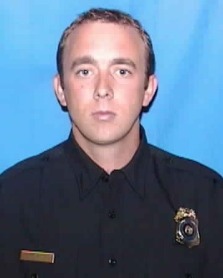MARTA Police Investigate themselves & Find No Misconduct, Ignore Witnesses who say Officer Shot Black Man who had his hands up
 From [HERE] MARTA police have exonerated officer Robert Waldo who shot to death a 19-year-old Black teen, Joetavius Stafford, last year who police claim had a gun the night he was killed. But District Attorney Paul Howard has yet to say whether his office agrees the shooting was justified.
From [HERE] MARTA police have exonerated officer Robert Waldo who shot to death a 19-year-old Black teen, Joetavius Stafford, last year who police claim had a gun the night he was killed. But District Attorney Paul Howard has yet to say whether his office agrees the shooting was justified.
Despite demands from outraged citizens the prosecutor still can't figure out what to do about the police killing - it has been under "review" since Oct. 15, 2011.
MARTA spokesman Lyle Harris said the agency concluded on July 17, six days after the Stafford family filed a wrongful death lawsuit, that the shooting didn’t violate use-of-force guidelines. MARTA’s internal investigation only cites Waldo’s account of the shooting, that Stafford made a threatening move. It does not quote civilian witnesses who said Stafford was surrendering or was shot in the back or while on the ground.
Family members said Stafford was heading to the Vine City MARTA Station after a football game when a fight broke out between Stafford and another group. Stafford's mother said someone fired a gun into the air, causing the gathered crowd to scatter. Rodney said his brother was running from the area when Officer Waldo began chasing him, and that he had his hands up when the officer shot him.
"I witnessed that he was shot in the back," Rodney Stafford said. "My little brother had his hands up, and they shot him in the back." He said the officer shot his brother in the back two more times when he was on the ground. [MORE]
“The MARTA report accepts at face value the account provided by their officer and emphasizes anything that supports MARTA’s position and it seems to downplay or omit everything else,” said Greg Feagle, a lawyer representing the Stafford family in the suit. “That doesn’t indicate objectivity or that the organization can investigate itself.”
MARTA Police Chief Wanda Dunham declined to comment on the internal investigation, but some outside experts on police procedures called the inquiry flawed because the investigators made a determination without interviewing all relevant witnesses.
“If they are going to do a sloppy job of an investigation, it is worse than not doing one,” said Geoff Alpert, a nationally recognized expert on policing at the University of South Carolina. “The public has the right to have a fair and impartial investigation performed. If you don’t, you use up social capital for no good reason.”
MARTA Police Sgt. Shekinia Reynolds interviewed Waldo two days after the shooting for 29 minutes, according to the taped interview; she interviewed six other officers, none of whom said they witnessed the shooting, for shorter periods.
Reynolds relied on interviews of the other civilian witnesses by the Georgia Bureau of Investigation rather than interviewing them herself, MARTA officials said. The GBI investigated the shooting for Howard. Waldo quit the MARTA police force in March.
Frank Rotondo, executive director of the Georgia Association of Chiefs of Police, said he would not have relied on GBI records to clear an officer in an internal investigation. He said appearing to ignore the civilian witnesses could put MARTA in a more “liability prone” situation in the lawsuit because it could make the agency look apathetic.
Mike Puglise, a former police officer and a lawyer who has defended and sued officers involved in shootings, said normal procedure in shooting investigations is to interview all witnesses to determine whether the officer is justified. “It is unheard of not to have those in the investigative file,” he said.
Waldo said he saw Stafford fire a pistol during a massive street brawl outside the Vine City MARTA rail station that followed a high school football game at the Georgia Dome. He said he chased Stafford behind the station and shot him just after he jumped off a ledge to the sidewalk and street.
The officer said he ordered Stafford to get on the ground and he fired when Stafford turned toward him because he feared Stafford was going to shoot. The gun, which was linked by DNA to Stafford, was found in the bushes on the ledge a number of feet away.
‘If all those things are true, then I don’t have a problem with the shooting but in this case you have witnesses who say he was surrendering and that is a problem,” Puglise said.
According to the autopsy report, Stafford was shot three times -- once in the left-front-chest area, once in the left side of the mid-back and once more in the mid-lower back area. It also says the shots do not appear to have occurred at close range. [MORE] The report did not provide any info on the sequence of the wounds, which could be a key finding in determining whether there was any wrongdoing. [MORE]